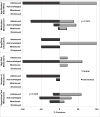Geriatric assessment-driven polypharmacy discussions between oncologists, older patients, and their caregivers
- PMID: 29530495
- PMCID: PMC6113101
- DOI: 10.1016/j.jgo.2018.02.007
Geriatric assessment-driven polypharmacy discussions between oncologists, older patients, and their caregivers
Abstract
Objectives: Polypharmacy (PP) and potentially inappropriate medications (PIM) are common in older adults with cancer, increasing the risk of adverse outcomes. Approaches to identifying and addressing PP/PIM are needed.
Materials and methods: Patients ≥70 years with advanced cancer were enrolled in this cluster-randomized study. All underwent geriatric assessment (GA), and oncologists randomized to the intervention arm received GA-driven recommendations; no information was provided to oncologists at usual care sites. For patients with PP (≥5 medications or ≥1 high-risk medication), clinic visits with treating oncologists were audiorecorded and transcribed, and discussions regarding PP/PIM identified. Quality of provider response was coded as dismissed, mentioned, acknowledged, or addressed.
Results: Forty patient transcripts were analyzed (20 per arm). More discussions occurred in the intervention group (n = 81) versus the usual care group (n = 51). More concerns per patient were brought up in the intervention group (4.1 vs. 2.6, p = 0.07). Physician-initiated discussions were higher in the intervention group (73% vs. 49%, p = 0.006). More PP concerns were "addressed" in the intervention group (59% vs. 45%, p = 0.1). Oncology supportive care medication concerns were more often addressed in the usual care group (58% vs. 18%, p = 0.008), but medication management concerns were addressed more commonly in the intervention group (38% vs. 79%, p = 0.003).
Conclusion: In this secondary analysis, a GA-driven intervention increased PP discussions, particularly about total number of medications and medication management. PP/PIM concerns were more commonly addressed in the intervention group, except for the subset of conversations about supportive care medications.
Keywords: Geriatric assessment; Polypharmacy.
Copyright © 2018 Elsevier Ltd. All rights reserved.
Conflict of interest statement
The authors have declared no conflicts of interest.
Figures
Similar articles
-
Communication With Older Patients With Cancer Using Geriatric Assessment: A Cluster-Randomized Clinical Trial From the National Cancer Institute Community Oncology Research Program.JAMA Oncol. 2020 Feb 1;6(2):196-204. doi: 10.1001/jamaoncol.2019.4728. JAMA Oncol. 2020. PMID: 31697365 Free PMC article. Clinical Trial.
-
Evaluation of a pharmacist-led medication assessment used to identify prevalence of and associations with polypharmacy and potentially inappropriate medication use among ambulatory senior adults with cancer.J Clin Oncol. 2015 May 1;33(13):1453-9. doi: 10.1200/JCO.2014.58.7550. Epub 2015 Mar 23. J Clin Oncol. 2015. PMID: 25800766
-
Associations of Polypharmacy and Inappropriate Medications with Adverse Outcomes in Older Adults with Cancer: A Systematic Review and Meta-Analysis.Oncologist. 2020 Jan;25(1):e94-e108. doi: 10.1634/theoncologist.2019-0406. Epub 2019 Sep 30. Oncologist. 2020. PMID: 31570516 Free PMC article.
-
Evaluating the association of frailty with communication about aging-related concerns between older patients with advanced cancer and their oncologists.Cancer. 2022 Mar 1;128(5):1101-1109. doi: 10.1002/cncr.34010. Epub 2021 Nov 11. Cancer. 2022. PMID: 34762734 Free PMC article. Clinical Trial.
-
Polypharmacy and potentially inappropriate medication use in geriatric oncology.J Geriatr Oncol. 2016 Sep;7(5):346-53. doi: 10.1016/j.jgo.2016.07.010. Epub 2016 Aug 3. J Geriatr Oncol. 2016. PMID: 27498305 Free PMC article. Review.
Cited by
-
Quality of Life of Caregivers of Older Patients with Advanced Cancer.J Am Geriatr Soc. 2019 May;67(5):969-977. doi: 10.1111/jgs.15862. Epub 2019 Mar 29. J Am Geriatr Soc. 2019. PMID: 30924548 Free PMC article.
-
Managing Polypharmacy in Older Adults with Cancer Across Different Healthcare Settings.Drug Healthc Patient Saf. 2021 Apr 29;13:101-116. doi: 10.2147/DHPS.S255893. eCollection 2021. Drug Healthc Patient Saf. 2021. PMID: 33953612 Free PMC article. Review.
-
Communication With Older Patients With Cancer Using Geriatric Assessment: A Cluster-Randomized Clinical Trial From the National Cancer Institute Community Oncology Research Program.JAMA Oncol. 2020 Feb 1;6(2):196-204. doi: 10.1001/jamaoncol.2019.4728. JAMA Oncol. 2020. PMID: 31697365 Free PMC article. Clinical Trial.
-
Research priorities to address polypharmacy in older adults with cancer.J Geriatr Oncol. 2021 Jul;12(6):964-970. doi: 10.1016/j.jgo.2021.01.009. Epub 2021 Feb 13. J Geriatr Oncol. 2021. PMID: 33589379 Free PMC article.
-
Association of polypharmacy and potential drug-drug interactions with adverse treatment outcomes in older adults with advanced cancer.Cancer. 2023 Apr 1;129(7):1096-1104. doi: 10.1002/cncr.34642. Epub 2023 Jan 24. Cancer. 2023. PMID: 36692475 Free PMC article. Clinical Trial.
References
-
- Salive ME. Multimorbidity in older adults. Epidemiol Rev. 2013;35:75–83. - PubMed
-
- Lau DT, Kasper JD, Potter DE, Lyles A, Bennett RG. Hospitalization and death associated with potentially inappropriate medication prescriptions among elderly nursing home residents. Arch Intern Med. 2005;165:68–74. - PubMed
-
- Smith BD, Smith GL, Hurria A, Hortobagyi GN, Buchholz TA. Future of cancer incidence in the United States: burdens upon an aging, changing nation. Journal of clinical oncology : official journal of the American Society of Clinical Oncology. 2009;27:2758–65. - PubMed
Publication types
MeSH terms
Grants and funding
LinkOut - more resources
Full Text Sources
Other Literature Sources
Miscellaneous




